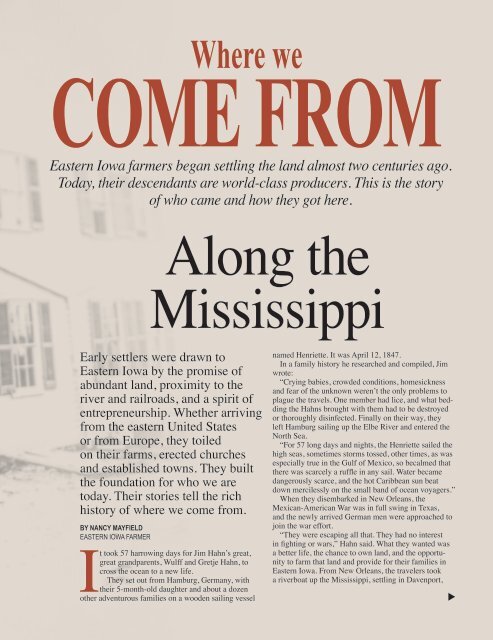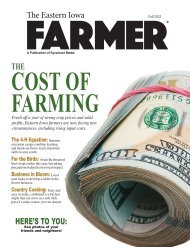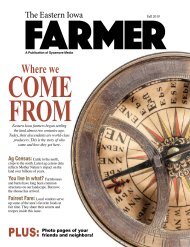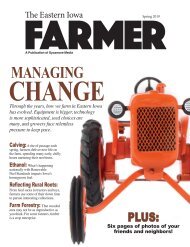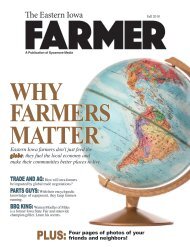Create successful ePaper yourself
Turn your PDF publications into a flip-book with our unique Google optimized e-Paper software.
<strong>Where</strong> we<br />
COME FROM<br />
Eastern Iowa farmers began settling the land almost two centuries ago.<br />
Today, their descendants are world-class producers. This is the story<br />
of who came and how they got here.<br />
Along the<br />
Mississippi<br />
Early settlers were drawn to<br />
Eastern Iowa by the promise of<br />
abundant land, proximity to the<br />
river and railroads, and a spirit of<br />
entrepreneurship. Whether arriving<br />
from the eastern United States<br />
or from Europe, they toiled<br />
on their farms, erected churches<br />
and established towns. They built<br />
the foundation for who we are<br />
today. Their stories tell the rich<br />
history of where we come from.<br />
BY NANCY MAYFIELD<br />
EASTERN IOWA FARMER<br />
It took 57 harrowing days for Jim Hahn’s great,<br />
great grandparents, Wulff and Gretje Hahn, to<br />
cross the ocean to a new life.<br />
They set out from Hamburg, Germany, with<br />
their 5-month-old daughter and about a dozen<br />
other adventurous families on a wooden sailing vessel<br />
named Henriette. It was April 12, 1847.<br />
In a family history he researched and compiled, Jim<br />
wrote:<br />
“Crying babies, crowded conditions, homesickness<br />
and fear of the unknown weren’t the only problems to<br />
plague the travels. One member had lice, and what bedding<br />
the Hahns brought with them had to be destroyed<br />
or thoroughly disinfected. Finally on their way, they<br />
left Hamburg sailing up the Elbe River and entered the<br />
North Sea.<br />
“For 57 long days and nights, the Henriette sailed the<br />
high seas, sometimes storms tossed, other times, as was<br />
especially true in the Gulf of Mexico, so becalmed that<br />
there was scarcely a ruffle in any sail. Water became<br />
dangerously scarce, and the hot Caribbean sun beat<br />
down mercilessly on the small band of ocean voyagers.”<br />
When they disembarked in New Orleans, the<br />
Mexican-American War was in full swing in Texas,<br />
and the newly arrived German men were approached to<br />
join the war effort.<br />
“They were escaping all that. They had no interest<br />
in fighting or wars,” Hahn said. What they wanted was<br />
a better life, the chance to own land, and the opportunity<br />
to farm that land and provide for their families in<br />
Eastern Iowa. <strong>From</strong> New Orleans, the travelers took<br />
a riverboat up the Mississippi, settling in Davenport,<br />
eifarmer.com SPRING 2024 | EASTERN IOWA FARMER 45


